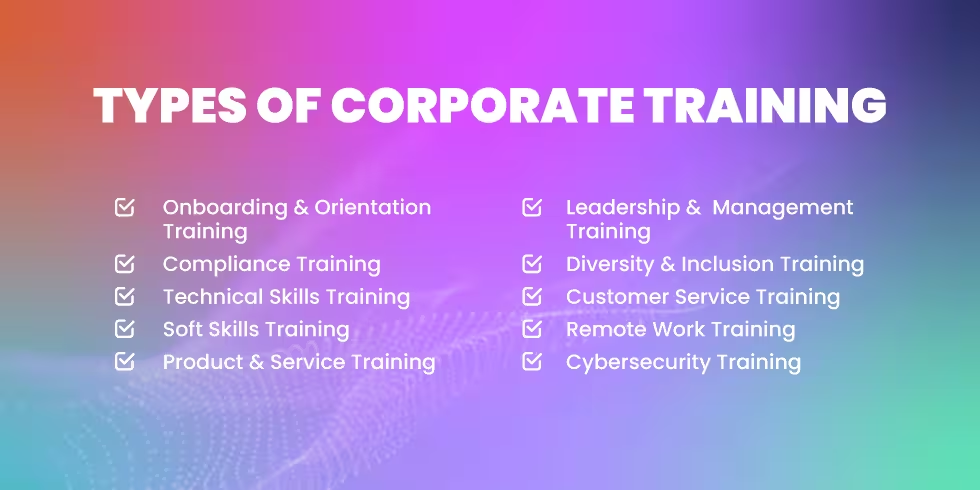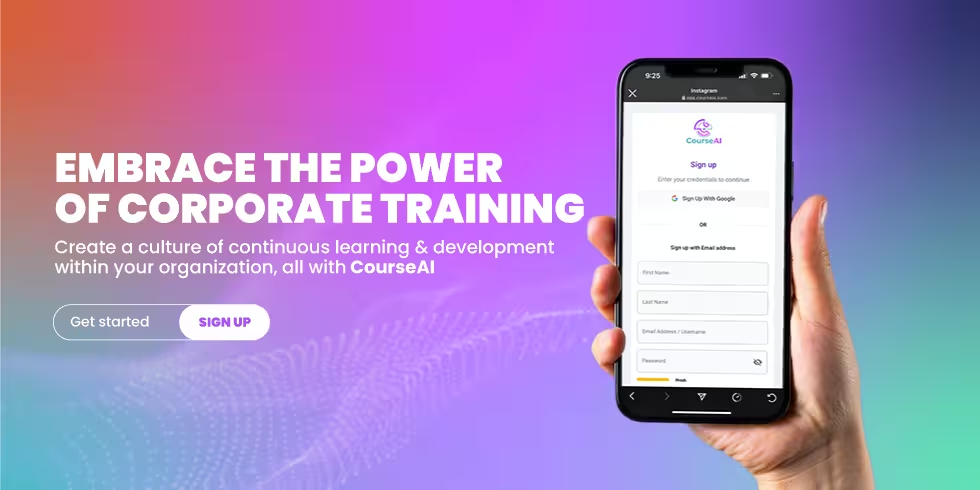Corporate training has become an essential aspect of modern business practices. Investing in the right types of corporate training programs can significantly enhance employee performance, boost productivity, and ensure business growth.
This guide will explore the various types of corporate training available, highlighting their importance and how they can be implemented effectively within an organization. Plus, gain inspiration with examples of how CourseAI works in the real-world corporate environment. Let’s begin!
The Importance of Corporate Training
Corporate training is not just about improving employee skills–it’s also about fostering a culture of continuous learning and engaging development.
With rapid technological advancements and changing market dynamics, businesses must ensure their workforce is equipped with the latest knowledge and skills. The types of corporate training programs that a company adopts can make a substantial difference in achieving these goals.
Types of Corporate Training

By understanding the different training options available and implementing them effectively, businesses can enhance employee skills, improve performance, and stay competitive in a rapidly changing market.
Here are some essential types of corporate training:
- Onboarding and Orientation Training
- Compliance Training
- Technical Skills Training
- Soft Skills Training
- Product and Service Training
- Leadership and Management Training
- Diversity and Inclusion Training
- Customer Service Training
- Remote Work Training
- Cybersecurity Training
1. Onboarding and Orientation Training
Onboarding and orientation are crucial first steps in the employee training process. These programs help new hires understand the company’s culture, values, policies, and procedures. Effective onboarding can reduce the time it takes for new employees to become productive members of the team. Types of corporate training like onboarding ensure that employees feel welcomed and supported from day one.
Example with CourseAI: CourseAI can create comprehensive onboarding modules that include interactive videos, quizzes, and virtual tours tailored to your company’s specific needs.
2. Compliance Training
Compliance training is mandatory in many industries to ensure that employees understand and adhere to laws, regulations, and company policies. This type of training covers areas such as workplace safety, anti-harassment policies, and data protection regulations. Implementing comprehensive types of corporate training programs for compliance can help prevent legal issues and promote a safe and respectful workplace.
Example with CourseAI: Deploy compliance training modules that update your team with the latest regulations and best practices (ex. HIPAA).
3. Technical Skills Training
As technology evolves, so do the skills required to operate it. Technical skills training focuses on equipping employees with the necessary knowledge to use specific software, tools, or equipment. This can include anything from IT certifications to training on new machinery. Incorporating technical skills training in your types of corporate training ensures that your workforce remains competent and competitive.
Example with CourseAI: CourseAI’s AI-driven platform identifies skill gaps and recommends personalized training paths to address them efficiently.
4. Soft Skills Training
Soft skills, such as communication, leadership, and teamwork, are essential for a harmonious and efficient workplace. Soft skills training programs aim to develop these interpersonal skills, which are crucial for collaboration and conflict resolution. Investing in soft skills training as part of your types of corporate training programs can lead to improved employee relationships and a more cohesive work environment.
Example with CourseAI: CourseAI provides interactive and engaging soft skills training modules that can be accessed anytime, anywhere.
5. Product and Service Training
For businesses that rely on sales teams or customer service representatives, product and service training is vital. This training ensures that employees have a deep understanding of the products or services they are selling or supporting. Effective product and service training can enhance customer satisfaction and drive sales, making it a key component of your types of corporate training strategy.
Example with CourseAI: CourseAI’s platform allows for creating dynamic product training modules that can be easily updated as your offerings evolve.
6. Leadership and Management Training
Developing future leaders is essential for the long-term success of any organization. Leadership and management training programs focus on building the skills needed to lead teams, make strategic decisions, and drive organizational success. These programs are often part of a broader types of corporate training programs designed to cultivate talent and prepare employees for higher responsibilities.
Example with CourseAI: Advanced leadership training courses that utilize AI to simulate real-life scenarios are possible with CourseAI, providing hands-on experience in a risk-free environment.
7. Diversity and Inclusion Training
Creating an inclusive workplace where all employees feel valued and respected is a top priority for many organizations. Diversity and inclusion training programs aim to educate employees on the importance of diversity, equity, and inclusion. By incorporating diversity and inclusion training into your types of corporate training, you can foster a more innovative and supportive work environment.
Example with CourseAI: Create comprehensive diversity training modules that can be customized to reflect your company’s unique culture and values.
8. Customer Service Training
Exceptional customer service is a cornerstone of business success. Customer service training programs equip employees with the skills needed to interact with customers effectively, handle complaints, and provide outstanding service. Including customer service training in your types of corporate training programs can lead to higher customer satisfaction and loyalty.
Example with CourseAI: Offer interactive customer service training simulations that help employees practice and refine their skills in a controlled setting.
9. Remote Work Training
With the rise of remote work, it’s essential to provide training that helps employees stay productive and engaged while working from home. Remote work training covers topics such as time management, virtual communication, and maintaining work-life balance. Integrating remote work training into your types of corporate training ensures that your employees can thrive in a remote or hybrid work environment.
Example with CourseAI: Create remote work training modules with CourseAI that address the unique challenges of remote work, providing practical tips and strategies for success.
10. Cybersecurity Training
In today’s digital age, cybersecurity is a critical concern for businesses. Cybersecurity training programs educate employees on best practices for protecting sensitive information and recognizing potential cyber threats. By including cybersecurity training in your corporate training programs, you can safeguard your organization against data breaches and other cyber risks.
Example with CourseAI: CourseAI offers the ability to create cybersecurity training modules that adapt to new threats, ensuring your team is always prepared.
Click here to read “5 Ways AI Infographic Generators Can Help You”
Implementing Effective Corporate Training Programs
To maximize the benefits of corporate training, it’s important to implement these programs effectively. Here are some tips for successful implementation:
Assess Training Needs
Conduct a thorough assessment to identify your organization’s specific training needs. This will help you determine which types of corporate training are most relevant.
Set Clear Objectives
Establish clear, measurable objectives for each training program. This will help you track progress and evaluate the training’s effectiveness.
Choose the Right Training Methods
Depending on the nature of the training, choose the most appropriate methods, such as in-person workshops, online courses, or blended learning approaches.
Engage Employees
Ensure that training programs are engaging and interactive. Use a variety of instructional techniques to keep employees motivated and interested.
Measure and Evaluate
Continuously measure the impact of your corporate training programs through feedback, assessments, and performance metrics. Use this data to improve and ensure ongoing effectiveness.
Conclusion

Investing in diverse corporate training programs is crucial for any organization’s growth and success. With CourseAI’s platform, you can create, deliver, and manage training programs tailored to your organization’s unique needs, ensuring that your employees are always at the forefront of industry advancements.
Embrace the power of corporate training and create a culture of continuous learning and development within your organization, all with CourseAI.

